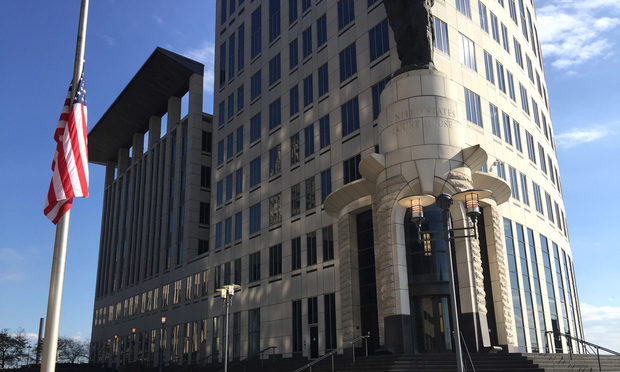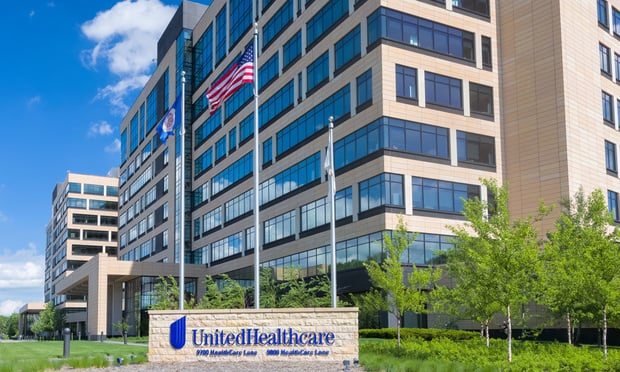 The trial was supposed to be abellwether for more than 2,600 lawsuits brought by cities,counties, states and other governments against opioid manufacturersand distributors. (Photo: Amanda Bronstad)
The trial was supposed to be abellwether for more than 2,600 lawsuits brought by cities,counties, states and other governments against opioid manufacturersand distributors. (Photo: Amanda Bronstad)
About 60 lawyers in Cleveland hammered out a last-minutesettlement on the eve of the first jury trial over the opioid crisis arriving bleary-eyed on whatwould have been opening statements on Monday.
|"It was a late night," said Paul Hanly of New York's SimmonsHanly Conroy, outside the courtroom after the judge dismissed thecase on Monday morning in light of the settlement. He negotiatedthe deal with Joe Rice, of Motley Rice, and Paul Farrell of GreeneKetchum, Farrell, Bailey & Tweel in Huntington, West Virginia.All three are co-lead counsel of the multidistrict litigation overthe opioid crisis.
|The $260 million settlement includes $215 million in cash fromthree of the nation's largest distributors of opioidpharmaceuticals—McKesson Corp., Cardinal Health Inc. andAmerisourceBergen Corp.—and $20 million from the sole manufacturer,Teva Pharmaceuticals, paid out in lump sums over 18 months. Tevaalso will provide $25 million in treatment pills, delivered overthree years.
|Related: Judge rejects key defenses in rulings ahead ofopioid trial
|Walgreens, which did not settle, could go to trial next year,Rice said on Monday.
|The trial before U.S. District Judge Dan Polster in the NorthernDistrict of Ohio was supposed to be a bellwether for more than2,600 lawsuits brought by cities, counties, states and othergovernments against opioid manufacturers and distributors. Two Ohiocounties, Cuyahoga and Summit, were the plaintiffs.
|Lawyers, media and spectators turned out before sunrise toattend the trial, filling the courtroom and two overflow rooms.
|Before the trial was set to begin, Polster asked the lawyers togo into his chambers. When he returned, he thanked the "bestlawyers in the country" who spent "a lot of work" on picking a jurylast week. He said he would dismiss the claims of the Ohio countiesagainst the settling defendants and sever Walgreens from the case.Walgreens now joins several other defendant companies that plan togo to trial against both Ohio counties at a later date. Polster hasset no trial date for that case.
|It was a disappointing end to those who sought to watch thetrial and a planned performance by plaintiffs attorney W. MarkLanier, who said he was prepared to do a "kicker opening."
|But the settlement, lawyers and county officials said, providedcash to two counties in a state among the most hard hit from theopioid crisis.
|"The proposed settlement will make significant progress to abatethe epidemic by providing resources for and applying funds directlyto necessary opioid-recovery programs," wrote Rice, Farrell andHanly on behalf of the plaintiffs' executive committee in theopioid multidistrict litigation. "Throughout this process, Summitand Cuyahoga Counties have tirelessly investigated, litigated, andprepared for the bellwether trial that would have begun today ifnot for this agreement. In doing so, the communities revealed factsabout the roles of the opioid industry that created and fueled theopioid epidemic."
|They said that although the trial didn't happen, discoveryrevealed new facts about the opioid crisis.
|"Additionally, through the discovery process, we learned thatthis country's pharmacy system has played a greater role in theopioid epidemic than previously realized," they wrote. "Cuyahogaand Summit will continue to litigate against pharmacy defendants tofurther understand the industry's failings and potentialwrongdoing."
|Outside the courthouse after the settlement's announcement, Ricesaid lawyers were in a "war room" in the U.S. Post Office buildingacross from the Ritz-Carlton in downtown Cleveland, finalizinglast-minute details of a deal until 1 a.m. on Monday. He saidnegotiations took place with the defendants by phone.
|When asked about how much of the settlement would go to attorneyfees, Cuyahoga County Executive Armond Budish said the fees wouldbe held in an escrow account based on their contractual agreementwith the two Ohio counties, which provides 25%, but that the feeswould not come from the settlement fund. Neither he nor Rice gavedollar figures.
|Meanwhile, Lanier said he was in his own "war room" at theRitz-Carlton with the trial team, which included other lawyers fromhis firm, as well as Don Migliori of Motley Rice and HunterShkolnik of New York's Napoli Shkolnik, who were planning to makearguments to the jury. Lanier said Peter Weinberger, of Cleveland'sSpangenberg, Shibley & Liber, who serves as liaison counsel inthe multidistrict litigation, was his "right-hand man."
|The trial team was going through 150 slides for the opening whenthey kept getting interrupted by phone calls from Rice with updateson settlement talks going on across the street.
|When asked why a settlement with the two Ohio counties did nothappen sooner, Lanier replied: "As bizarre as it sounds, everydollar makes a difference. There are people who will die from anopioid death today."
|"It's worth staying awake until 1 a.m. in the morning," Laniersaid.
|The settlement comes after talks over a possible globalsettlement worth $48 billion broke down on Friday. That settlement,which had the support of some state attorneys general, who werepart of the talks, would have resolved all the opioid lawsuitsacross the nation. In court, Polster said he was with the lawyersand attorneys general until 7:40 p.m. that day trying to reach adeal.
|"I want these discussions to continue," Polster said onMonday.
|But outside the courthouse on Monday, many lawyers and countyofficials said the global settlement wasn't enough actual cash andit wasn't soon enough, allowing the defendants to pay over severalyears.
|"There should be a global settlement, but it's got to be fairand it's got to be now," Rice said. "They wanted to pay less, andwe wanted them to pay more."
|"We still want a global settlement," Rice said. "We're a longway from being through."
|Read more:
Complete your profile to continue reading and get FREE access to BenefitsPRO, part of your ALM digital membership.
Your access to unlimited BenefitsPRO content isn’t changing.
Once you are an ALM digital member, you’ll receive:
- Critical BenefitsPRO information including cutting edge post-reform success strategies, access to educational webcasts and videos, resources from industry leaders, and informative Newsletters.
- Exclusive discounts on ALM, BenefitsPRO magazine and BenefitsPRO.com events
- Access to other award-winning ALM websites including ThinkAdvisor.com and Law.com
Already have an account? Sign In
© 2024 ALM Global, LLC, All Rights Reserved. Request academic re-use from www.copyright.com. All other uses, submit a request to [email protected]. For more information visit Asset & Logo Licensing.








